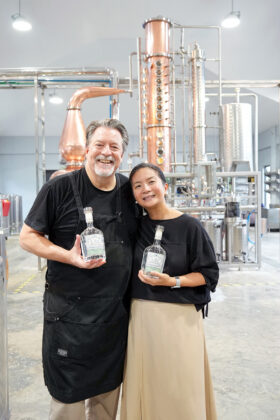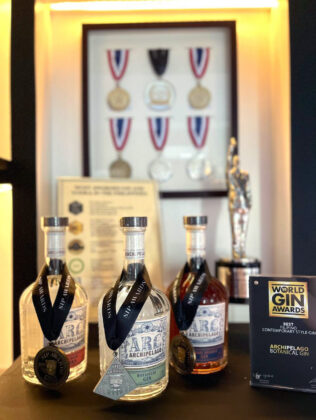ARC Botanical Gin reflects the country’s terroir
WHEN people talk about terroir (the conditions that give wine its flavor; from soil quality to climate), it’s easy to dismiss the idea that distilled spirits have any sort of terroir, processed and filtered as they are. But what if gin does have terroir, imbued by hard work, a good story, and great water? More importantly, what if you can find all that in the Philippines?
On Aug. 15, Full Circle Craft Distillers (the makers of ARC Botanical Gin) gave a tour of their distillery in Calamba, Laguna. While media guests oohed and aahed at the star of the show, a 415-liter copper still custom-made for them by German firm CARL, Full Circle Distillers co-founders Matthew and Laurie Westfall were just as eager to show off their botanicals, sourced from all over the Philippines.
Gin is a spirit made from juniper — its base — and Mr. Westfall admits that they import it from Tuscany, because juniper trees take 60 years to mature. However, he showed off basins and basins of Philippine citrus fruits like dalandan and calamansi, vying for space with ylang-ylang and sampaguita flowers, various herbs, and even pine from Benguet. The various botanicals they use number to about 28, with 22 of them sourced from the Philippines. “We have everything here,” he said about the flora of this country. All of these go into ARC Botanical Gin.
HITTING THE GROUND RUNNING
While the distillery was founded just in 2018, the gin already won the Gold Medal at the World Gin Awards 2019 in London, as well as the World Spirits Awards 2019 in Austria. In the year of their founding, they won Philippines Distillery of the Year at the Asia International Spirits Competition. Their Navy Strength and Barrel Reserve Gin won the Global Asian Spirits Masters Awards just this year, and they have pocketed many other awards besides.
Mr. Westfall calls Full Circle Distillery so because of his grandfather, an emigré who, having fled the Russian Revolution, landed in the Philippines and worked for a beverage company (he went on to invent Royal Tru Orange, according to Mr. Westfall). After their family migrated to the United States, Mr. Westfall, in the third generation, found his way back to the Philippines through the Peace Corps, and he has stayed here since, doing development work with the US Agency for International Development (USAID) and the Asian Development Bank (ADB).
He said that he first drew up his business plan in the 1990s, but life got in the way of opening up his dream distillery. “To get out of this suit, and actually go and be an entrepreneur, to work in the Philippines, and give something back,” he said about his dreams back then. For the past 15 years, his wife and he studied about gin from Kentucky to Stuttgart.
But why gin?
“Gin is a blank canvas. You can do anything and work with any botanicals, as long as you have juniper in them. You can play around with hundreds and hundreds of botanicals, coming up with a unique flavor profile. That allowed us to tell the story of the archipelago and bring flavors from all around the islands,” he said.
KEEPING THINGS LOCAL
Seeing their awards and their facility, we look back to a Filipino-branded spirit that also made it internationally: Don Papa Rum. Earlier this year, Don Papa Rum was acquired by spirits conglomerate Diageo for a multi-billion-peso deal. “Don Papa did an amazing job,” said Mr. Westfall, saying that Don Papa was the first mover in the Philippine craft spirits category that was able to offer their product to the world. He also cites the multiple artisanal brands around the world that have been acquired by giants (Sipsmith gin, for example, being acquired by Suntory Beam).
“For us, we’re a very different animal. This is anchored on our family narrative… the challenge you have when you get bigger and bigger is you start losing some of the artisanal techniques. You have to go industrial. That’s not in our DNA in any way whatsoever. We have no intention of ever flipping this company. We’re going to grow to a certain point where we can adhere to our principles, and our techniques and traditions,” he said.
That certain point is around 200,000 cases per year (they’re currently at 5,000 cases; targeting 12,000 next year). “That’s where you tap out. And you can tap out as a very successful company where everyone’s profitable, and you’re having fun,” he said.
Right now, they can be found in 18 countries, including in the US and the European Union, and are targeting four more countries next year (including Australia).
CALAMBA WATER
Back to terroir. On the question of distilled spirits having little to no terroir, cleaned out as they are by the distillation process, he says: “I don’t think that’s fair to say.”
“We deal with Philippine botanicals that come from out of the soil and we deal with water that comes out of these ancient volcanic aquifers here in Laguna. That’s terroir.”
What makes Calamba water special? According to Mr. Westfall, when his German master distillers and mentors tasted their water, they said, “That is the sweetest water we’ve ever tasted,” and even compared it to water from the French Alps.
He explains how that happened.
“We’re at the foothills of Mt. Makiling.” The water from the triple canopy forest has been trickling down the mountain, and going down into volcanic aquifers, filtered through layers and layers of volcanic rock. “That water has never been touched in centuries. It’s been mostly filtered, through the forest, through the soil, the volcanic rock. For centuries. Hundreds and hundreds. Thousands. Millennia of this water, going down. No one has extracted that water for any purpose except in the last 30, 40 years,” he said.
That goes into gin that’s been helping to fund wildlife conservation efforts in Palawan, not to mention helping small-scale farms all over the country, and providing jobs and education in their own Laguna community. The Westfalls are also targeting to go net-zero, and they’ve started by going zero-waste in the distillery, where all the used-up botanicals become compost.
PROUDLY PHILIPPINE MADE
The gin does taste good. Smelling tantalizingly like a great perfume, it runs down the throat cleanly and has a mildly floral flavor. They made us taste another variety, made with black bamboo, that smelled mildly mysterious, and had a very prim taste punctuated by a sharp, piquant kick when you swallow.
Mr. Westfall talks about the importance of letting everyone know that the product is made in the Philippines, with Philippine produce, by Philippine hands. But he decries the image the “local” has here — “We’re our own worst enemies. If it’s ‘local,’ there has to be a shortcut, there’s some sort of scam.”
This image has been changing of late. Mr. Westfall noted the strides Filipino skill has taken its people, from fashion to the culinary arts, not to mention every other field where there’s (probably) a Filipino. “What we’re trying to do is to turn that narrative on its head, and actually surprise people.
“It’s our time. It’s long overdue.”
The Full Circle Distillery is open for tours on Saturdays from 2 to 4 p.m. It costs P1,800 per person, and discounted gins are up for sale. — Joseph L. Garcia






